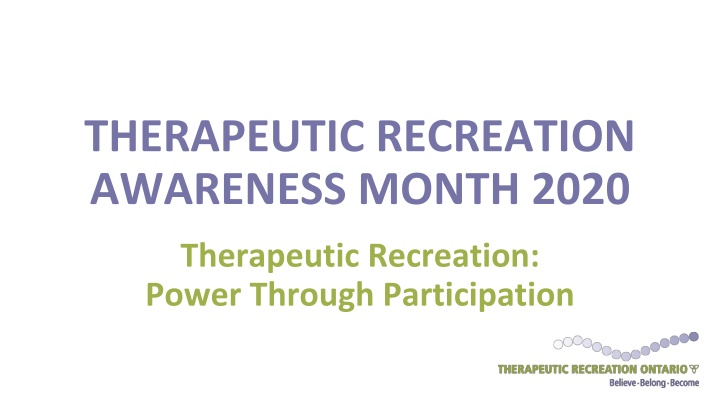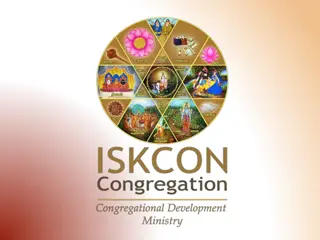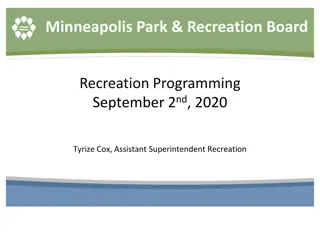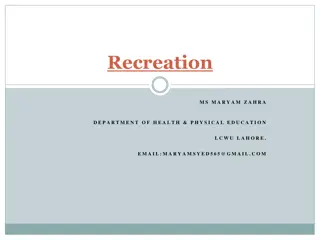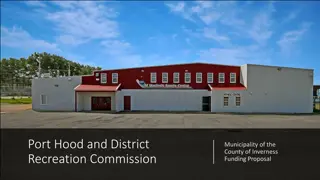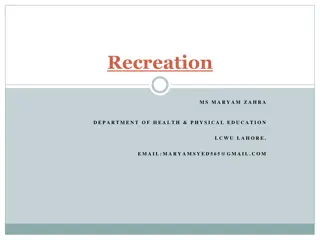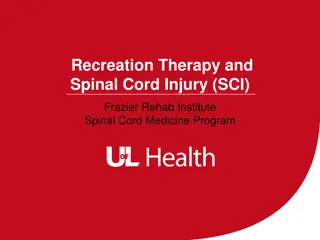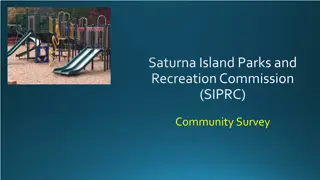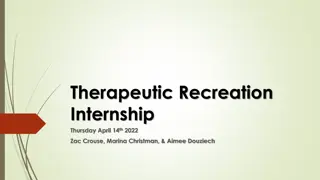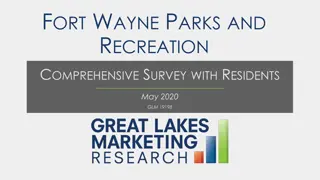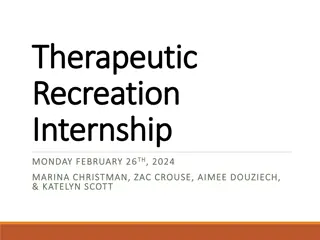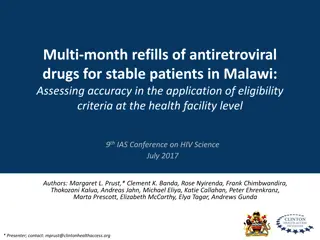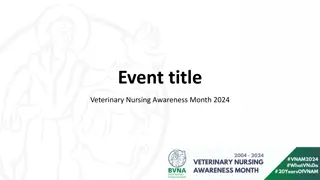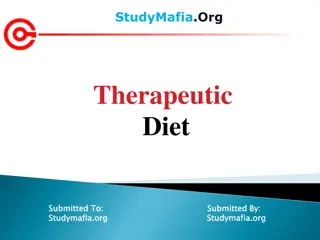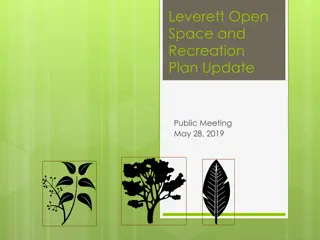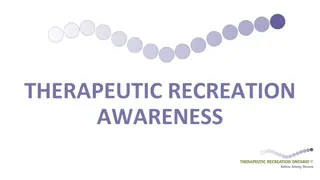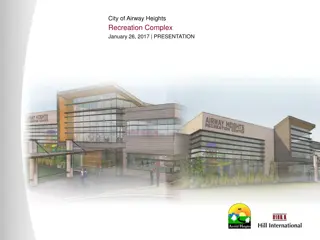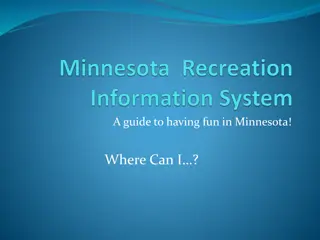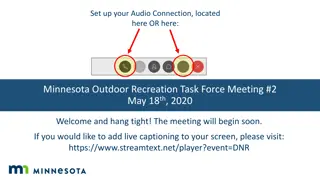Therapeutic Recreation Awareness Month 2020
Therapeutic Recreation Awareness Month 2020 emphasizes the benefits of recreation and leisure activities in enhancing personal health, promoting community well-being, and fostering individual growth. Recreation contributes to healthy aging, development in children and youth, and building strong families and communities. It also reduces healthcare costs, crime rates, and negative behaviors, while promoting self-esteem and positive social interactions.
Download Presentation

Please find below an Image/Link to download the presentation.
The content on the website is provided AS IS for your information and personal use only. It may not be sold, licensed, or shared on other websites without obtaining consent from the author.If you encounter any issues during the download, it is possible that the publisher has removed the file from their server.
You are allowed to download the files provided on this website for personal or commercial use, subject to the condition that they are used lawfully. All files are the property of their respective owners.
The content on the website is provided AS IS for your information and personal use only. It may not be sold, licensed, or shared on other websites without obtaining consent from the author.
E N D
Presentation Transcript
THERAPEUTIC RECREATION AWARENESS MONTH 2020 Therapeutic Recreation: Power Through Participation
Benefits of Recreation and Leisure (Leisure Information Network, 2017) Recreation and active living are essential to personal health; a key determinant of health status Helps people live longer adding up to two years to life expectancy Prolongs independent living for seniors by compressing the disease and impairment period typically associated with aging Recreation is a key to balanced human development helping Canadians reach for their potential Recreation is essential to the development of children and youth: Motor skills, intellectual capacities, and social skills are learned through play and sports Creativity is learned through play and arts/cultural activities
Benefits of Recreation and Leisure Recreation, sports, arts and culture builds strong families and healthy communities Produces leaders who serve their communities in many ways Build social skills and stimulates participation in community life Recreation reduces health care, social service and police/justice costs Reduces both the incidence and the severity of illness and disability, lowering healthcare costs Reduces crime and social dysfunction reducing police, justice, and incarceration costs
Benefits of Recreation, sports, arts and culture Recreation is essential to quality of life Builds self-esteem and positive self-image - foundations to personal quality of life Nurture growth, acquisition of life skills, and independent living for those with a disability Recreation reduces self-destructive and anti-social behaviour Reduce self-destructive behaviour in youth an antidote to smoking, substance abuse, suicide and depression Reduce racism building understanding between diverse cultures
Common Models of Practice Recreation Therapists follow a model to guide their practice. Common models include: The Leisure Ability Model The Strengths Based Approach The Health Protection/Health Promotion Model Leisure & Well Being Model Ask your Recreation Therapist which model they use!
The Leisure Ability Model (Stumbo & Peterson, 2009) The Leisure Ability Model serves as a graphic representation of the services that therapeutic recreation practitioners utilize to help a client achieve the goal of an Independent Leisure Lifestyle. There are 3 main components to The Leisure Ability Model: Recreation Participation Leisure Education Functional Intervention
Strengths Based Approach (Anderson & Heyene, 2012) . The strengths based approach utilized in Therapeutic Recreation focuses on an individuals internal and external strengths as avenues for optimizing an individual s quality of life. Principles: Professionals provide opportunities for clients to use self determination and utilization of strengths in order to build and achieve more meaningful leisure Collaboration with the clients (not expert based) Leisure is freely chosen and is used as an arena to develop skills Participants dreams drive the helping relationship Don t assume the extent of someone s abilities; what they can develop, change and achieve is limitless
The Health Protection/Health Promotion Model This model assumes that every individual has the desire for optimal health and wellness. It is suggested that the focus of Therapeutic Recreation should be for a client to achieve maximum health, not to recover from illness. An individual that is healthy will have the desire and ability to pursue higher levels of personal growth and development. The purpose of therapeutic recreation is to recover following threats to health (health protection) and to achieve as high a level of health as possible (health promotion). (Austin, 1988)
Leisure and Well Being Model (Carruthers & Hood, 2007) The Leisure and Well-Being Model (LWM) is a strengths- based therapeutic recreation (TR) service delivery model that provides a theoretical framework for TR practice designed to facilitate clients development of the skills, knowledge, and resources essential to well-being. Enhancing Leisure Experiences Savouring Leisure Authentic Leisure Leisure Gratifications Mindful Leisure Virtuous Leisure Positive affect, emotion, and experience Well-Being: a state of successful, satisfying, and productive engagement with one s life and the realization of one s full physical, cognitive, and social emotional potential Developing Resources Psychological Resources Cognitive Resources Physical Resources Social Resources Environmental Resources Cultivation and expression of one s full potential Components of TR Service Delivery Proximal & Medial Goals Distal Goals
Frequently Asked Questions What is Therapeutic Recreation and what are the benefits? What do Therapeutic Recreation practitioners do and where do they work? Who receives Therapeutic Recreation services? What training do Therapeutic Recreation practitioners have? Is there a professional organization for Therapeutic Recreation in this province? If you have any additional questions you can ask your therapeutic recreation practitioner or see our website www.trontario.org
What is Therapeutic Recreation? Therapeutic Recreation Ontario (TRO) defines Therapeutic Recreation as a process that: utilizes functional intervention, leisure education and recreation participation enables persons with physical, cognitive, emotional and/or social limitations to acquire and/or maintain the skills, knowledge and behaviours that will allow them to enjoy their leisure optimally, function independently with the least amount of assistance and participate as fully as possible in society Therapeutic Recreation intervention is provided by trained professionals in clinical and/or community settings
What are the benefits of Therapeutic Recreation? Improved physical and cognitive abilities Increased confidence and self esteem Greater involvement in the community Increased independence Strengthened interpersonal skills and relationships Increased awareness of leisure lifestyles Increased happiness Decreased stress in your life Enhanced well-being Increased social engagements and opportunities And many more!
What do Therapeutic Recreation practitioners do? Conduct client assessments Develop individualized intervention plans to address identified client needs Plan, implement, and evaluate programs and services Facilitate therapeutic programs in which clients learn about personal leisure needs, develop new skills, and learn about community resources Document client progress Work as an integral member of an interdisciplinary team and engage in community integration with the client Conduct research on the efficacy of therapeutic recreation services Advocate for the development of therapeutic recreation
Where do Therapeutic Recreation practitioners work? Acute or chronic care hospitals Inpatient and outpatient rehabilitation programs Mental health settings Long-term care facilities or day programs for older adults Children s treatment centres Youth and adult correctional facilities Wellness centres and day hospitals Private practice Municipal parks and recreation departments Community-based agencies serving people with disabilities Substance abuse treatment centres
Who receives Therapeutic Recreation services? Children and adults with physical and emotional disabilities Youth at risk; youth and adults in correctional settings Individuals with a developmental disability Individuals with mental illness such as depression, addictions, eating disorders, etc. Individuals with acquired brain injury and/or spinal cord injury Individuals residing in long-term care facilities or palliative care settings Individuals in communities through their local parks and recreation departments Older adults participating in day programs or seniors centres
What training do Therapeutic Recreation practitioners have? Therapeutic Recreation practitioners educated in Ontario may have a variety of educational backgrounds. Registered Professional Members of TRO have successfully completed one of the following options: Degree in Therapeutic Recreation (R/TRO) Allied degree + Post Graduate Certificate in Therapeutic Recreation (R/TRO) Allied degree + Therapeutic Recreation Diploma (R/TRO) TR diploma (R/TRO DIP) Allied diploma + Post Graduate Certificate in Therapeutic Recreation (R/TRO DIP)
Is there a professional organization for Therapeutic Recreation in this Province? Yes, Therapeutic Recreation Ontario (TRO)! Website: www.trontario.org See the following slides about TRO, and for more information, check out the Infographic in the TR Awareness month package!
Therapeutic Recreation Ontario Our Vision: Therapeutic Recreation for ALL Our Mission: Leading the TR profession through growth, advocacy and innovation. 18
TRO Member Benefits Provincial Registration designation (R/TRO, R/TRO DIP) Educational opportunities Marketing and advocacy tools to educate and promote the TR profession Professional documents Regular communication: e-TRO newsletter and social media Learn more: www.trontario.org/membership 19
Therapeutic Recreation: Power Through Participation Happy Therapeutic Recreation Awareness Month 2020! For more information contact TRO t: 289-626-8761 (TRO1) e: info@trontario.org 20
References This material has been adapted from: Anderson, L., & Heyne, L. (2012). Therapeutic Recreation Practice: A Strengths Approach. State College, PA: Venture Publishing Austin, D.R. (1998). The Health Promotion/Health Promotion Model. Therapeutic Recreation Journal, 32, 109 117. Hood, C., & Carruthers, C. (2007). Enhancing leisure experience and developing resources: Leisure and Well Being Model, Part II. Therapeutic Recreation Journal (41) 298-325. Leisure Information Network (2017). Benefits of Therapeutic Recreation. Retrieved from http://www.lin.ca/resource/html/bencat.htm Stumbo, N.J., & Peterson, C.A. (2009). Therapeutic Recreation Program Design, 5th ed. San Francisco, CA: Pearson Education, Inc.
